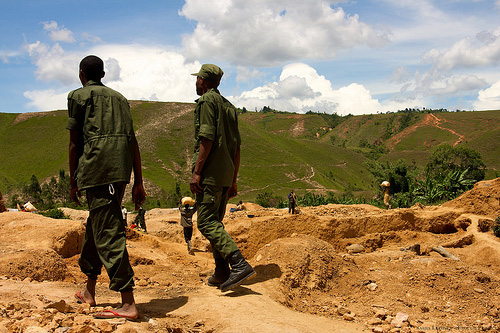
This post originally appeared on Care2.com:
Under Secretary of State, Robert Hormats, recently said the issue of conflict minerals in the Congo is “one of the greatest moral issues of our time … and one that requires bold, resolute, and moral action by the U.S.” As citizens and consumers we have never been closer to helping reduce violence in eastern Congo. Now we need the Obama Administration to be a leader in the final charge.
The growing movement to push governments and industry towards monitoring and certifying the conflict mineral trade in Congo — a trade responsible for immeasurable violence and destruction in the region — has made remarkable progress over the past year, and is poised to have significant impact on conflict affected communities on the ground. Through the tracing, auditing, and certification of conflict minerals, the international community can make a difference in creating peace and economic development in Congo, while at the same time cutting off funding to illegal armed groups responsible for some of the most heinous human rights abuses of our generation.
In the US, consumers and Congress have done their part through the creation and passage of legislation demanding that companies using conflict minerals trace and report whether their supply chains contribute to conflict in the region — similar efforts are now springing up in Canada, Australia, and the European Union. The electronics industry has taken steps to begin the auditing of mineral processing facilities around the world to determine whether these facilities, responsible for processing the materials that end up as chips and solder in our electronics, source from conflict areas or support armed groups. The last piece needed is a credible certification scheme that monitors mineral traffic in the region from mine of origin to point of export. For this step, U.S. leadership from Secretary of State Hillary Clinton is essential — and to this point unfortunately absent.
The good news is the beginnings of a certification scheme do exist. A framework has been developed by the eleven countries of the International Conference of the Great Lakes Region, or ICGLR, and although promising in design, it remains unimplemented and controlled solely by the governments that have been beneficiaries of the conflict mineral trade. A true certification process must include input from beyond the walls of government. Industry, international NGOs, and local civil society must play a part in developing and monitoring the process. Transparency, credibility, and accountability must form the foundation of any process and the U.S. has the tools to ensure these elements are present.
Regional governments, industry, and other international stakeholders have publicly agreed that this type of multi-stakeholder input is needed and are open to partnership with the U.S. What’s missing is a “conductor,” or leader with the necessary gravitas to bring stakeholders to the table and ensure all parties move forward in good faith. The U.S. government, led by Secretary Clinton, can play this role given the diplomatic and economic toolbox it brings to the table. But moreover, the U.S. should play this role, as the passage of the conflict minerals provision in the Dodd-Frank Act has been the driving force for progress on mineral certification to this point.
The United States, as home to the largest end-user companies of conflict minerals and as a powerful diplomatic actor in Africa’s Great Lakes region, has a choice: Either exercise leadership and help transform the current process on conflict minerals into real certification or step back and let the vested interests continue to develop systems that lack checks and balances. The administration should use its convening power, diplomatic influence, and sanctioning power to strengthen current regional certification plans, harmonize industry efforts and ensure credible monitoring on the ground.
The Obama Administration should act on the words of Under Secretary Hormats and work to convene a high-level partnership on conflict mineral certification with leading electronics and end-user companies, together with the government of Congo, and other regional governments, aimed at unifying the regional- and industry-led initiatives and gaining consensus on an internationally accepted system. Join us in calling on Secretary Clinton to lead the U.S. government in becoming the “conductor” that delivers an international certification system on conflict minerals and ensures our electronic devices are not financing war and rape in Congo.
Photo: Gold mine in South Kivu, Congo (Sasha Lezhnev/ Enough Project)

